
"Me and Bobby McGee" is a song written by American singer-songwriter Kris Kristofferson and originally performed by Roger Miller. Fred Foster shares the writing credit, as Kristofferson wrote the song based on a suggestion from Foster. A posthumously released version by Janis Joplin topped the U.S. singles chart in 1971, making the song the second posthumously released No. 1 single in U.S. chart history after "(Sittin' On) The Dock of the Bay" by Otis Redding. Gordon Lightfoot released a version that reached number 1 on the Canadian country charts in 1970. Jerry Lee Lewis released a version that was number 1 on the country charts in December 1971/January 1972 as the "B" side of "Would You Take Another Chance On Me." Billboard ranked Joplin's version as the No. 11 song for 1971.
Soft rock is a derivative form of pop rock that originated in the late 1960s in the U.S. region of Southern California and in the United Kingdom. The style smoothed over the edges of singer-songwriter and pop rock, relying on simple, melodic songs with big, lush productions. Soft rock was prevalent on the radio throughout the 1970s and eventually metamorphosed into a form of the synthesized music of adult contemporary in the 1980s.

Wingspan: Hits and History is a greatest hits compilation album by English musician Paul McCartney, featuring material spanning his first solo album McCartney in 1970 to the 1984 Give My Regards to Broad Street movie soundtrack.

Greatest Hits is the eleventh official album release for English musician Elton John, and the first compilation. Released in November 1974, it spans the years 1970 to 1974, compiling ten of John's singles, with one track variation for releases in North America and for Europe and Australia. It topped the album chart in both the United States and the United Kingdom, staying at number one for ten consecutive weeks in the former nation and eleven weeks in the latter.
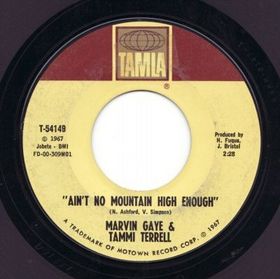
"Ain't No Mountain High Enough" is a song written by Nickolas Ashford & Valerie Simpson in 1966 for the Tamla label, a division of Motown. The composition was first successful as a 1967 hit single recorded by Marvin Gaye and Tammi Terrell, and became a hit again in 1970 when recorded by former Supremes frontwoman Diana Ross. The song became Ross's first solo number-one hit on the Billboard Hot 100 chart and was nominated for the Grammy Award for Best Female Pop Vocal Performance.

Eric Howard Carmen is an American singer, songwriter, guitarist, and keyboardist. He was first known as the lead vocalist of the Raspberries. He had numerous hit songs in the 1970s and 1980s, first as a member of the Raspberries, and then with his solo career, including hits such as "All by Myself", "Never Gonna Fall in Love Again", "She Did It", "Hungry Eyes", and "Make Me Lose Control".

Greatest Hits 1970–2002 is a career-spanning compilation album of popular songs by English musician Elton John, released on UTV Records in 2002. It debuted on the Billboard 200 chart at number 12 on 30 November 2002, for a total run of 67 weeks. It was certified gold and platinum in December 2002, double platinum in March 2003, triple platinum in August 2004, four- and five-times platinum simultaneously in February 2011, and 6× platinum in April 2016 by the RIAA.
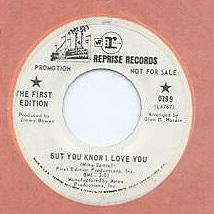
"But You Know I Love You" is a song written by Mike Settle, which was a 1969 pop hit for Kenny Rogers and The First Edition, a group that included Settle and Kenny Rogers. The song also became a major country hit by Bill Anderson in 1969. In 1981, a cover version of "But You Know I Love You" by singer Dolly Parton topped the country singles charts.
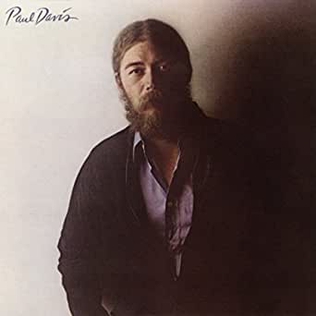
Paul Lavon Davis was an American singer and songwriter, best known for his radio hits and solo career which started worldwide in 1970. His career encompassed soul, country, and pop. His most successful songs are 1977's "I Go Crazy", a No. 7 pop hit which once held the record for the longest chart run on the Billboard Hot 100, and 1982's "'65 Love Affair", which at No. 6 is his highest-charting single. Another pop hit, "Cool Night", was released in 1981. In the mid-1980s, he also had two No. 1 country hits as a guest vocalist on songs by Marie Osmond and Tanya Tucker.

"Abraham, Martin and John" is a 1968 song written by Dick Holler. It was first recorded by Dion, in a version that was a substantial North American chart hit in 1968–1969. Near-simultaneous cover versions by Smokey Robinson and the Miracles and Moms Mabley also charted in the U.S. in 1969, and a version that same year by Marvin Gaye became the hit version in the UK. It was also a hit as part of a medley for Tom Clay in 1971, and has subsequently been recorded by many other artists.
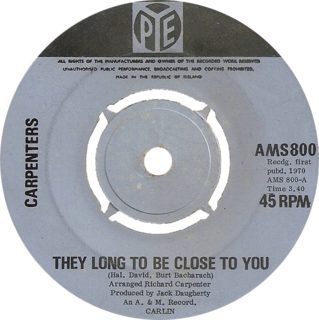
"(They Long to Be) Close to You" is a song written by Burt Bacharach and Hal David. The best-known version is that recorded by American duo the Carpenters for their second studio album Close to You (1970) and produced by Jack Daugherty. Released on May 14, 1970, the single topped both the US Billboard Hot 100 and Adult Contemporary charts. It also reached the top of the Canadian and Australian charts and peaked at number six on the charts of both the UK and Ireland. The record was certified gold by the Recording Industry Association of America (RIAA) in August 1970.

"It's Only Make Believe" is a song written by drummer Jack Nance and Mississippi-born singer Conway Twitty, while both were touring across Ontario, Canada in 1958. The song was recorded on May 7 for MGM Records; produced by Jim Vienneau, it featured Floyd “Lightnin’” Chance on double bass. It was released on side B of "I'll Try" on July 14, 1958. Known as Harold Lloyd Jenkins until changing his name in 1957, Twitty was a relatively unknown rock n' roll singer at the time. That all changed when side B finally hit the chart in September, then made No. 1 twice, on November 10 and 24. The single topped both U.S. and the UK Singles Chart, and became the only No. 1 pop single of his career. Years later, on a segment of 'Pop Goes The Country', Twitty stated it was a hit in 22 countries, and sold over 8 million copies. He did not become a country music star until he crossed over in 1966.

"Let It Be Me" is a popular song originally published in French in 1955 as "Je t'appartiens" interpreted by Gilbert Bécaud. It became popular worldwide with an English version by the Everly Brothers and later with the duet by Betty Everett and Jerry Butler.
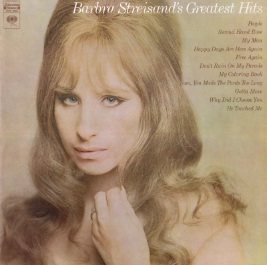
Barbra Streisand's Greatest Hits is the first greatest hits album recorded by American vocalist Barbra Streisand. It was released on January 1, 1970, by Columbia Records. The record is a compilation consisting of 11 commercially successful singles from the singer's releases in the 1960s, with a majority of them being cover songs. The songs on Barbra Streisand's Greatest Hits originally appeared on one of the singer's eight previous albums and span in release from 1963 to 1968. It contains her most commercially successful tracks, including her first Billboard Hot 100 top ten single "People" and top 40 entry "Second Hand Rose". The album was distributed on compact disc in 1986 and rereleased under the title The Hits in 2006.

"Spinning Wheel" is a song from 1968 by the band Blood, Sweat & Tears, written by Canadian lead vocalist David Clayton-Thomas and appearing on their eponymous album.

Anne Murray's Greatest Hits is a compilation album by Canadian Country vocalist Anne Murray, issued by Capitol Records in 1980. It is a collection of nine previously issued singles released between 1970 and 1980, as well as one new track, "Could I Have This Dance", which was newly recorded for this album.
"Little Green Apples" is a song written by Bobby Russell that became a hit for three different artists, with their three separate releases, in 1968. Originally written for and released by American recording artist Roger Miller, "Little Green Apples" was also released as a single by American recording artists Patti Page and O. C. Smith that same year. Miller's version became a Top 40 hit on the Billboard Hot 100 chart and on the UK Singles Chart, while Page's version became her last Hot 100 entry and Smith's version became a #2 hit on the Hot 100 chart. The song earned Russell a Grammy Award for Song of the Year and for Best Country Song. In 2013, "Little Green Apples" was covered by English recording artist Robbie Williams featuring American recording artist Kelly Clarkson, which became a top 40 hit in Mexico.
"Try a Little Kindness" is a song written by Curt Sapaugh and Bobby Austin, first recorded by American country music singer Glen Campbell. The song was a hit on three different music charts: it peaked at number two for one week on the country charts. "Try a Little Kindness" went to number one for one week on the Hot Adult Contemporary chart as well as peaking at number 23 on the Billboard Hot 100.
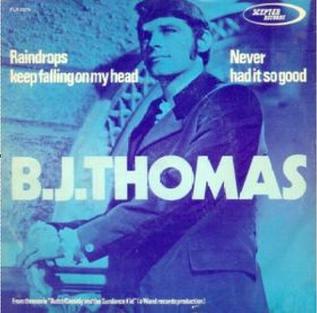
"Raindrops Keep Fallin' on My Head" is a song written by Burt Bacharach and Hal David for the 1969 film Butch Cassidy and the Sundance Kid. The uplifting lyrics describe somebody who overcomes his troubles and worries by realizing that "it won't be long till happiness steps up to greet me."

"So Sad " is a song written by Don Everly, which was released by The Everly Brothers in 1960. The song was later a country hit for multiple artists in the 1970s and 80s.

















